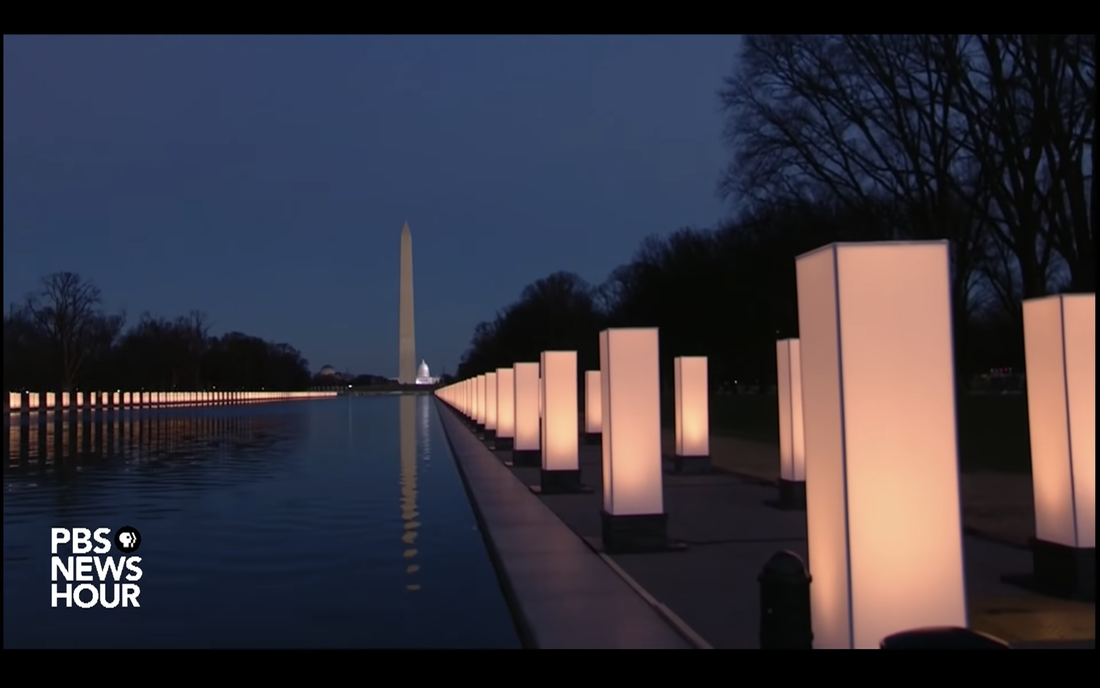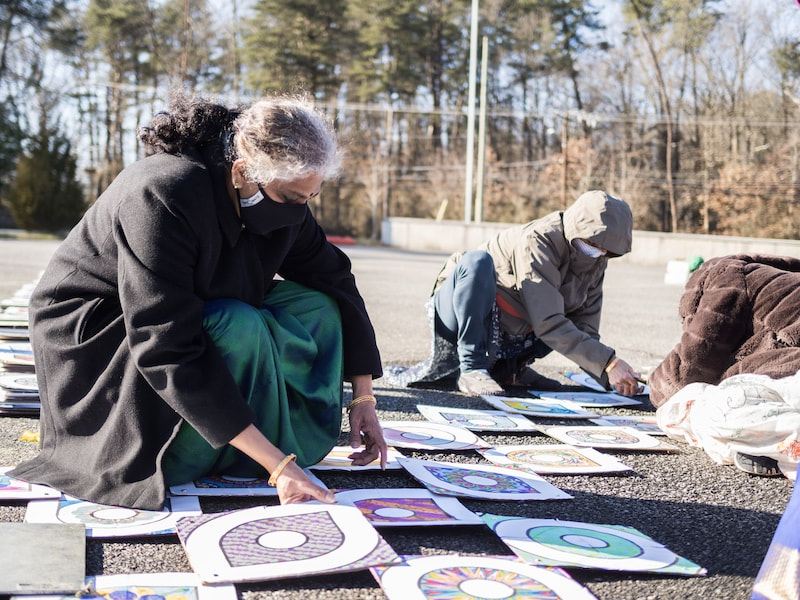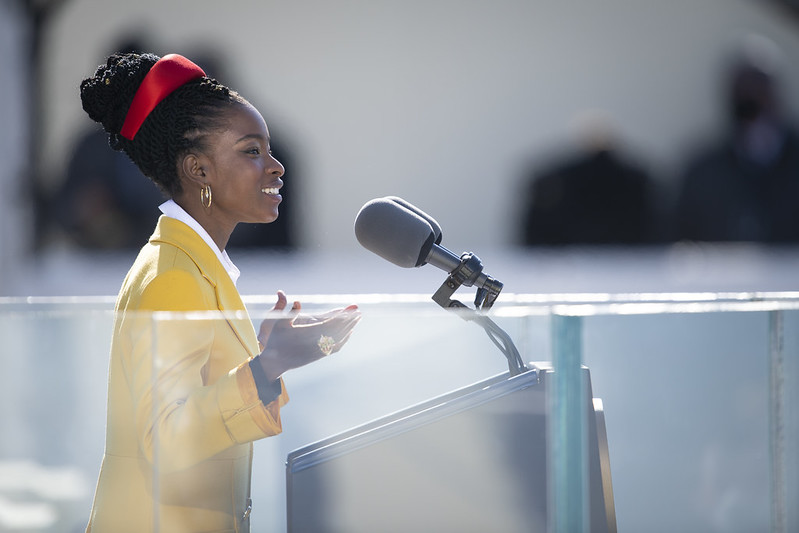|
(DOD Photo by Navy Petty Officer 1st Class Carlos M. Vazquez II)
Beyond the hope and promise of the inauguration of any new American president, we at Quad City Arts are still riding high from the celebratory events of Jan. 20 in Washington, D.C. Amplifying the stirring call of President Joe Biden to national unity, and healing, we saw the timeless power of art, music, and poetry used anew to connect, bind, uplift, comfort, and inspire the nation -- and why arts and culture matter, now more than ever during this devastating, isolating pandemic. “This inauguration truly highlighted the power of the arts through installations and performance of poetry and music -- all of which focused on the message of unity and hope,” said Kevin Maynard, executive director of Quad City Arts. “Through the use of lighting at locations in Washington D.C., Boston, Las Vegas, and others, art was used to unify a nation while memorializing those lost to Covid-19. As people were unable to gather on the National Mall, flags were planted to represent the states and territories, this installation art furthered a message of unity. “Poetry was used to solidify a message of hope, but not without challenge,” Maynard said. “Music was used to celebrate. It was encouraging to see the arts, especially the visual arts, so well represented on the national stage. “The arts have the power to inspire and to heal. It was clear that was the intention at this celebration, and it worked,” he said. Several art installations and performances in Washington and around the country have defined and expressed the boundless loss, grief, and hope we feel at this critical, unprecedented juncture in history, including:
(Photo by Victoria Pickering)
Her temporary art installation (through November), as is the case with the many makeshift memorials that have emerged throughout the pandemic, sought to remind people not only of the immense scale of loss, but also emphasize the individual, according to PBS. People were able to personalize the flags by writing down the names. Others left messages. In September, the COVID Memorial Project planted 20,000 U.S. flags on the National Mall. Each flag represented 10 lives then lost to the virus. Aside from national installations like that project and Firstenberg’s, there have also been flag memorials that reflect how Covid has hit different regions of the U.S. · An installation of 200,000 flags and 56 pillars of light—representing every U.S. state and territory—opened on the National Mall on Monday night ahead of the inauguration. The "Field of Flags" occupied the space normally filled by the public, who were unable to attend the event in person due to the coronavirus pandemic and the heightened security in Washington following the deadly attack by rioters at the Capitol on Jan. 6.
(DOD Photo by Navy Petty Officer 1st Class Carlos M. Vazquez II)
· On Jan. 19, the Reflecting Pool in front of the Lincoln Memorial was lit as a memorial to the more than 400,000 lives lost from Covid-19. Communities across the country were invited to illuminate buildings and ring church bells in a national moment of unity and remembrance.
(Video Source: PBS News Hour)
· A project to create a massive crowd-sourced kolam tile installation, led by artist Shanthi Chandrasekar, honored Vice President Kamala Harris’s maternal heritage. The 2,500-square-foot work was originally planned to be installed in front of the Capitol, but following the violent insurrection at the site, it was postponed until after Inauguration Day. · Following a year when differences and divisions have dominated headlines, the Kennedy Center’s REACH campus is home to a free outdoor art installation, UNITY | PEACE | FORWARD, through Feb. 28. The exhibit is “a space for contemplation and a glimpse into the minds of performers, artists, writers, and cultural leaders about their hopes, fears, dreams, and aspirations in a time of uncertainty and isolation,” according to Washington’s Kennedy Center. Developed by the Kennedy Center as a collaboration between International Programing and the office of Accessibility and VSA, UNITY | PEACE | FORWARD elevates the voices of artists with disabilities and also forwards the Center’s commitment to accessibility with a companion online component.
(Video Source: The Kennedy Center)
The UNITY installation at the Reflecting Pool by the River Pavilion features art from five VSA emerging young artists. The PEACE flag displayed on the hillside of the REACH Gardens is a collage of 270 smaller flags of all the U.S. states and territories, as well as flags from all the world countries with which the U.S. maintains diplomatic relations. · In addition to the star-studded musical performances during the inauguration (such as Lady Gaga, Jennifer Lopez and Garth Brooks), and in a special “Celebrating America” concert that night, Jan. 20 made a superstar of 22-year-old poet Amanda Gorman. A Harvard grad from Los Angeles, she is a former National Youth Poet Laureate, and moved many with her electrifying “The Hill We Climb,” penned for the occasion.
(DOD Photo by Navy Petty Officer 1st Class Carlos M. Vazquez II)
“Gorman echoed, in dynamic and propulsive verse, the same themes that Biden has returned to again and again and that he wove throughout his inaugural address: unity, healing, grief and hope, the painful history of American experience and the redemptive power of American ideals,” NPR wrote. Where Biden said, “We must end this uncivil war,” Gorman declared, “We lay down our arms so we can reach out our arms to one another.” Gorman, like Biden, had a speech impediment as a child. (Biden had a stutter; Gorman had difficulty pronouncing certain sounds.) She told NPR's Steve Inskeep that her speech impediment was one reason she was drawn to poetry at a young age. “Having an arena in which I could express my thoughts freely was just so liberating that I fell head over heels, you know, when I was barely a toddler,” she said. Ryan Collins, a Q-C poet and executive director of the Midwest Writing Center, said that Gorman was an excellent choice to read at the inauguration. “As someone who works with young writers, who are often made to feel like their work doesn't matter, I think it was incredibly important for young writers and artists to see someone like Gorman deliver so well on such a massive stage, and I think it's validating not just for the work -- that poetry matters, but also for all of those who do that work and have a poetry practice, especially young women, especially writers of color,” he said. “I saw many poets around my age mention how they were reminded of their earliest encounters with poetry -- specifically Maya Angelou reading at the first Clinton inauguration in 1993 -- and how that stayed with them, helped put them on a path,” Collins said. “Seeing so many poets, my peers, who I respect and admire, share that sentiment was assuring that the same thing is happening right now. “Kids all over the country are seeing a young woman being celebrated for her craft and her performance,” he said. “I am sure the effects of that will reverberate out into our culture in ways that will surely enrich our lives, just as Angelou's reading did nearly 30 years ago.” Rene Gellerman, president/CEO of United Way Quad Cities (and board member for River Music Experience and Quad Cities Cultural Trust), was also thrilled with the inaugural emphasis on arts and soaring rhetoric. “I was reminded of the power each of us have in upholding unity. Words matter. Tone matters. Intent matters,” she said. “Each of us are responsible for the kind of world we want to live in. The lessons and spirit of the inaugural ceremony can be applied in our own organizations and community. For example, when the world changed beyond what we would have ever guessed last year, our community responded. We accepted reality, pivoted and aimed to serve our region’s immediate needs.” “By recognizing where the need is greatest and applying our resources, we can identify and build the interventions that give people the opportunity for economic mobility, quality education and health care -- regardless of ZIP code,” Gellerman said, adding that we must heed Gorman’s inspiring words, “see the light; be the light.” “Now is the time for the Quad-Cities to prove we’re all in this together,” she said. “Music and art have a way of teaching us things we didn’t even know we were looking to,” Gellerman said of concisely expressing those ideals. “It inspires hope.” “I was moved by how much I appreciate and take for granted positivity, the power that we each individually have in creating unity,” she said. “Think about Amanda Gorman and her poem, what she did to inspire people to come together. We all have that power. We don’t utilize it enough -- the music, the positive nature of those songs, how we can overcome challenges, see the resiliency of human nature.”
(Video source: Katy Perry - Firework (Live from Celebrating America Inauguration Special)
The “Celebrating America” concert – hosted by Tom Hanks at the Lincoln Memorial – featured many impassioned, uplifting performances, including by Bruce Springsteen, Foo Fighters, Demi Lovato, Justin Timberlake, John Legend, Jon Bon Jovi, Tim McGraw and Tyler Hubbard, and fittingly concluded by a spectacular, huge fireworks display, accompanying Katy Perry’s exuberant “Firework.” Bookending his Lincoln Memorial performance of “The Rising” in January 2009 (complete with gospel choir then), Springsteen started the 2021 evening show solo with his “Land of Hope and Dreams.” Appropriately, it sings in part: “Leave behind your sorrows Let this day be the last Tomorrow there'll be sunshine And all this darkness past Big wheels roll through fields Where sunlight streams Meet me in a land of hope and dreams.” In a new country song “Undivided,” sung by Tim McGraw and Tyler Hubbard, current tensions also were addressed with an eye to selfless, Biden-esque solutions: “I think it's time to come together You and I can make a change Maybe we can make a difference Make the world a better place Look around and love somebody We've been hateful long enough Let the Good Lord reunite us 'Til this country that we love's Undivided.” Hubbard (of Florida Georgia Line) co-wrote the upbeat, inspirational anthem with Chris Loocke while reflecting on his personal quarantine in his tour bus after testing positive for Covid. “Music gives us hope and brings us together in a way nothing else can. This doesn’t mean we don’t have work to do. Quite the opposite,” McGraw told Billboard. “I loved the positivity of this song and that it called me to check myself and to remember that love is bigger.” While Covid-19 has devastated arts organizations worldwide, and canceled so many events and opportunities patrons would normally have, many groups and institutions in the Q-C have adapted to find alternate ways of meeting their mission. Supporting the arts in the Quad Cities impacts quality of life, civic pride, and economic development. After four years when the Trump Administration cast a cold eye toward the arts – consistently seeking to eliminate federal funding – Maynard is optimistic that the new administration will return to strong funding of the arts on a national level. “After all, it makes good business sense as the arts make up 4.5 percent of the GDP,” Maynard said. "Seeing the arts celebrated on the national stage renews our sense of pride and celebrates America’s rich and diverse culture," he said. Comments are closed.
|
Archives
July 2024
Categories
All
|
Let's Get Social
Be first to know about our digital programming, insider news, our latest projects projects, and much more!
Quad City Arts does not trade, share, or sell information that you provide to us.
Quad City Arts does not trade, share, or sell information that you provide to us.
Rock Island Gallery
|
HOME
|
SUPPORTMake a tax-deductible donation to Quad City Arts and support art in your community!
ABOUTQuad City Arts is dedicated to enriching the quality of life in the Quad City region through the arts. The organization’s dual role of presenting the arts and humanities, as well as serving as an arts resource, allows us to serve more than 350,000 people annually in the Arts Center in Rock Island and at over 200 rural and urban community sites.
Looking for something?VIDEO FOOTAGE PROVIDED BY DPHILMS AND MICKLE COMMUNICATIONS
© 2024 Quad City Arts is a 501(c)(3). Privacy Statement |







 RSS Feed
RSS Feed



